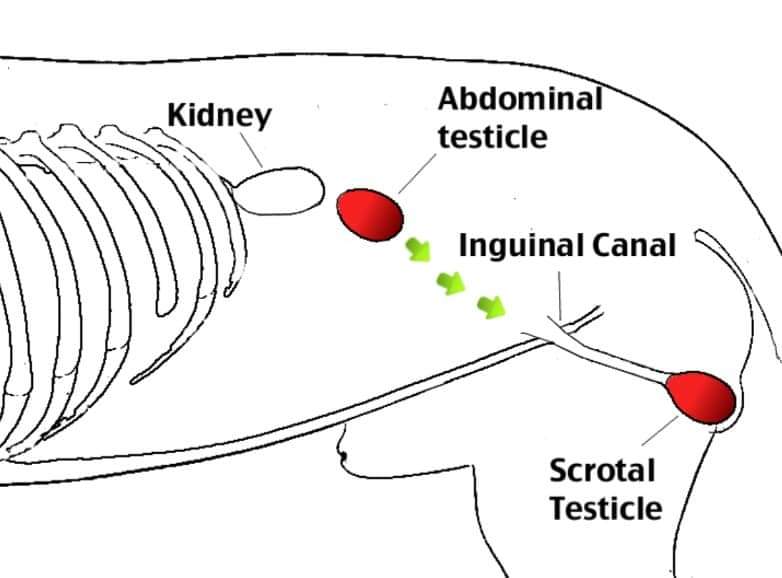RETAINED TESTICLE (Cryptorchidism) in Dogs
post created By AMARNATH MUTHUKRISHNAN Veterinary surgeon AMULYA PETS SPECIALITY CLINIC SALEM
Cryptorchidism is the medical term that refers to the failure of one or both testicles (testes) to descend into the scrotum. The testes develop near the kidneys within the abdomen and normally descend into the scrotum by two months of age. In certain dogs it may occur later, but rarely after six months of age.
In most cases of cryptorchidism, the testicle is retained in the abdomen or in the inguinal canal (the passage through the abdominal wall into the genital region through which a testicle normally descends).
Sometimes the testicle will be located just under the skin (in the subcutaneous tissues) in the groin region, between the inguinal canal and the scrotum.
How is cryptorchidism diagnosed?
In cases of abdominal cryptorchidism, the testicle cannot be felt from the outside. Abdominal ultrasound or radiographs (X-rays) may be performed to determine the exact location of the retained testicle but this is not often done before surgery as it is not required to proceed with surgery. Typically only one testicle is retained, and this is called unilateral cryptorchidism.
If you have a dog that does not appear to have testicles but is exhibiting male behaviors, a hormonal test called an hCG stimulation test can be performed to see if he is already neutered. Even simpler, your veterinarian can check for penile spines which are dependent on testosterone and will disappear 6 weeks after neutering.
What causes cryptorchidism
Cryptorchidism occurs in all breeds, but the toy breeds are at higher risk. Approximately 75% of cases of cryptorchidism involve only one retained testicle while the remaining 25% involve failure of both testicles to descend into the scrotum.
The right testicle is more than twice as likely to be retained as the left testicle.
The condition appears to be inherited since it is commonly seen in families of dogs, although the exact cause is not fully understood.
What are the signs of cryptorchidism?
This condition is rarely associated with pain or other signs, until or unless a complication develops. In its early stages, a single retained testicle is significantly smaller than the other, normal testicle. If both testicles are retained, the dog may be infertile. The retained testicles continue to produce testosterone but generally fail to produce sperm.
What is the treatment for cryptorchidism?
Neutering and removal of the retained testicle(s) are recommended as soon as possible. If only one testicle is retained, the dog will have two incisions – one for extraction of each testicle. If both testicles are in the inguinal canal, there will also be two incisions. If both testicles are in the abdomen, a single abdominal incision will allow access to both.
What if pet parents don’t want to neuter their dog?
There are several good reasons for neutering a dog with cryptorchidism. The first is to remove the genetic defect from the breed line. Cryptorchid dogs should never be bred.
Second, dogs with a retained testicle are more likely to develop a testicular tumor (cancer) in the retained testicle.
Finally, dogs with a retained testicle typically develop the undesirable characteristics associated with intact males like urine marking and aggression.
“The risk of developing testicular cancer is estimated to be at least ten times greater in dogs with cryptorchidism than in normal dogs.”
What is the prognosis for a dog with cryptorchidism?
The prognosis is excellent for dogs that undergo surgery early, before problems develops in the retained testicle. The surgery is relatively routine, and the outcomes are overwhelmingly positive.
Thanks for our team Duty Veterinary Doctor Cosmos Kani , Externship doctor Kajal Tambe Asst veterinarian Rajesh Kumar final year student and our vet assistant Meganathan Vpvs today for helping Mr.Kandha Swamy raja pet parent of JOE male GSD 2 YEARS for operating unilateral abdominal cryptrochidism …
AMULYA PETS SPECIALITY CLINIC SALEM
DR AMARNATH MUTHUKRISHNAN.


